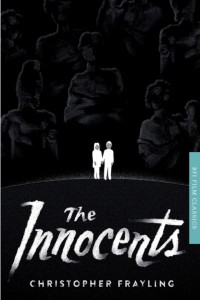The Innocents
The Innocents (BFI Film Classics) by Christopher Frayling (BFI Palgrave Macmillan, October 2013). 120 pages. ISBN: 978-1844573431 (paperback). £10.99
 About the Reviewer: Josephine Botting is a fiction curator at the BFI National Archive where she programmes film seasons and hosts events. She has contributed to the BFI books 39 Steps to the Genius of Hitchcock and Ealing Revisited (both 2012) and Gothic: the Dark Heart of Film (2013) as well as other BFI publications and online resources. She is currently completing a PhD on British film director Adrian Brunel. She is the producer of the BFI Flipside release, Her Private Hell.
About the Reviewer: Josephine Botting is a fiction curator at the BFI National Archive where she programmes film seasons and hosts events. She has contributed to the BFI books 39 Steps to the Genius of Hitchcock and Ealing Revisited (both 2012) and Gothic: the Dark Heart of Film (2013) as well as other BFI publications and online resources. She is currently completing a PhD on British film director Adrian Brunel. She is the producer of the BFI Flipside release, Her Private Hell.
 The BFI’s Film Classics are a wonderful and much-copied idea: a series of rich and diverse monographs on both established screen classics and classics-in-the-making. Authors and titles are paired to bring the subject to life and enlighten the reader, enhancing the enjoyment and understanding of a film text. The cover designs for several titles have recently been updated and the artwork produced by Matt Young for this special edition, part of the BFI’s Gothic offering, is particularly striking.
The BFI’s Film Classics are a wonderful and much-copied idea: a series of rich and diverse monographs on both established screen classics and classics-in-the-making. Authors and titles are paired to bring the subject to life and enlighten the reader, enhancing the enjoyment and understanding of a film text. The cover designs for several titles have recently been updated and the artwork produced by Matt Young for this special edition, part of the BFI’s Gothic offering, is particularly striking.
One of the most pleasurable aspects of the series is the different, often very personal, approaches taken by each author and in The Innocents, Sir Christopher Frayling’s scholarly interest in, and affection for, Jack Clayton’s 1961 film comes clearly across. Frayling has undertaken extensive research into the director’s personal papers, now housed in the BFI Special Collections department, in order to chart the stages in the development of the project. Delving into the director’s past, Frayling puts forward the view that Clayton’s lack of a father offers an explanation for his particular interest in the story of two orphaned children; and asserts that Clayton was the driving force behind the film, resisting the attempts of the executives at Twentieth Century Fox to water down some of its more controversial aspects.
The book is littered with interesting asides, such as the fact that Cary Grant turned down the role of ‘the uncle’ (eventually played by Michael Redgrave) because Clayton refused to introduce a scene for him at the end of the film. We also learn that Clayton kept the white pigeons used in the film and went on to become a very successful pigeon breeder.
 Learning on Screen
Learning on Screen